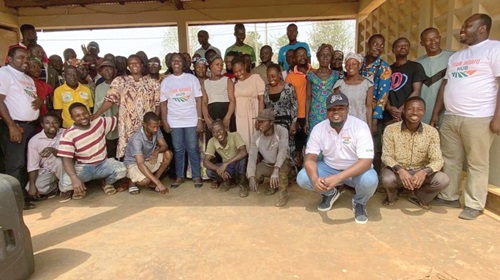
Akuafo Hub initiates project to combat aflatoxin
Akuafo Hub, an agricultural focused project, has commenced an initiative to fight aflatoxin contamination, a toxic substance produced by fungi which thrives in dried and stored maize.
The project aimed at educating maize farmers across the country to help encourage and promote the proper processing of maize before presenting it onto market.
It also sought to eliminate the aflatoxin contamination in maize products leading to serious health risks such as liver cancer and child stunting.
In all about 2,000 maize farmers across the country have been enrolled onto the project.
Advertisement
Through the programme, farmers received regular voice messages in his local language, teaching him best practices in maize drying, shelling, and storage.
The Akuafo Hub project was part of the Centre for African Leaders in Agriculture (CALA) initiative under AGRA.
It was developed by a team of food safety experts, agricultural policymakers and digital innovators to bridge the knowledge gap for farmers, particularly those with limited literacy skills.
The team driving the initiative include the Chief Executive Officer (CEO) of the Chamber of Fertilisers Ghana; Prince Akoto-Adipah, CEO of Cowtribe Inc, Peter Awin; Agribusiness Expert at Ministry of Food and Agriculture’s Food Systems and Resilience Project, Margaret Davids Opoku-Agyeman; Principal Regulatory Officer of Foods and Drugs Authority (FDA), Dr Ernest Bonah; and the Head of Fertiliser Analytical Unit at MoFA, Adisatu Iddrisu
Scope
A seasoned agricultural expert, Adisatu Iddrisu, identified aflatoxin contamination as a major problem facing the agricultural sector, particularly because it aligned with the erswhile government’s flagship programme 'Planting for food and Jobs'.
She said the voice messaging concept itself came from Peter Awin of Cowtribe, an agritech entrepreneur who had previously used mobile technology to deliver veterinary services to farmers.
Leveraging this experience, he said the project designed and implemented the mobile-based training approach that now delivered life-changing information to maize farmers across Ejura.
For his part, Dr Ernest Bonah, a food safety expert, said he led the development of the training curriculum. This, he said, ensured that farmers received scientifically sound, practical information tailored to their realities.
Impact
An agribusiness expert, Margaret Davids Opoku Agyeman, who played a key role in engaging local aggregators and MoFA extension officers indicated that before the intervention, only 37.7 per cent of farmers knew about aflatoxins; this had increased to about 77.7 per cent since the commencement of the programme.
Mrs Opoku-Agyeman emphasised that over 85 per cent of farmers who received training reported changes in “at least one unsafe practice, such as spraying weedicides to hasten cob drying or drying maize directly on the ground; with the use of tarpaulin sheets for drying increasing by 24.8 per cent, thereby reducing contamination risks significantly”.
She added that the project beyond education, had also created opportunities for young people, with over 300 youth trained in aflatoxin detection and post-harvest management.
Another member of the team, Prince Akoto-Adipah, a finance and business development expert who is leading efforts to scale the initiative beyond Ejura highlighted that the team was working “to ensure that more farmers can benefit from AKUAFO HUB's training, while also linking them to premium markets where aflatoxin-free maize can fetch better prices”.
This, he said, was critical in building partnerships with grain buyers, regulatory agencies and agribusinesses to expand the impact of the project nationwide.
Kwame Poku, a maize farmer in Ejura in the Ashanti Region, lauded the impact of the intervention, saying, "I never knew my maize was unsafe.
Now, I dry my maize on a tarpaulin, grade out bad grains and store them properly.
My income has improved because buyers trust my maize."
Mr Poku recounted that he faced prior to the initiation of the programme as he and his fellow farmers dried maize directly on the ground, stored the in humid conditions, and even sprinkled water on maize to increase weight before selling which accelerated aflatoxin contamination.
The farmer added that he understood that aflatoxin contamination begins long before his maize reaches the market through Akuafo Hub’s intervention.
